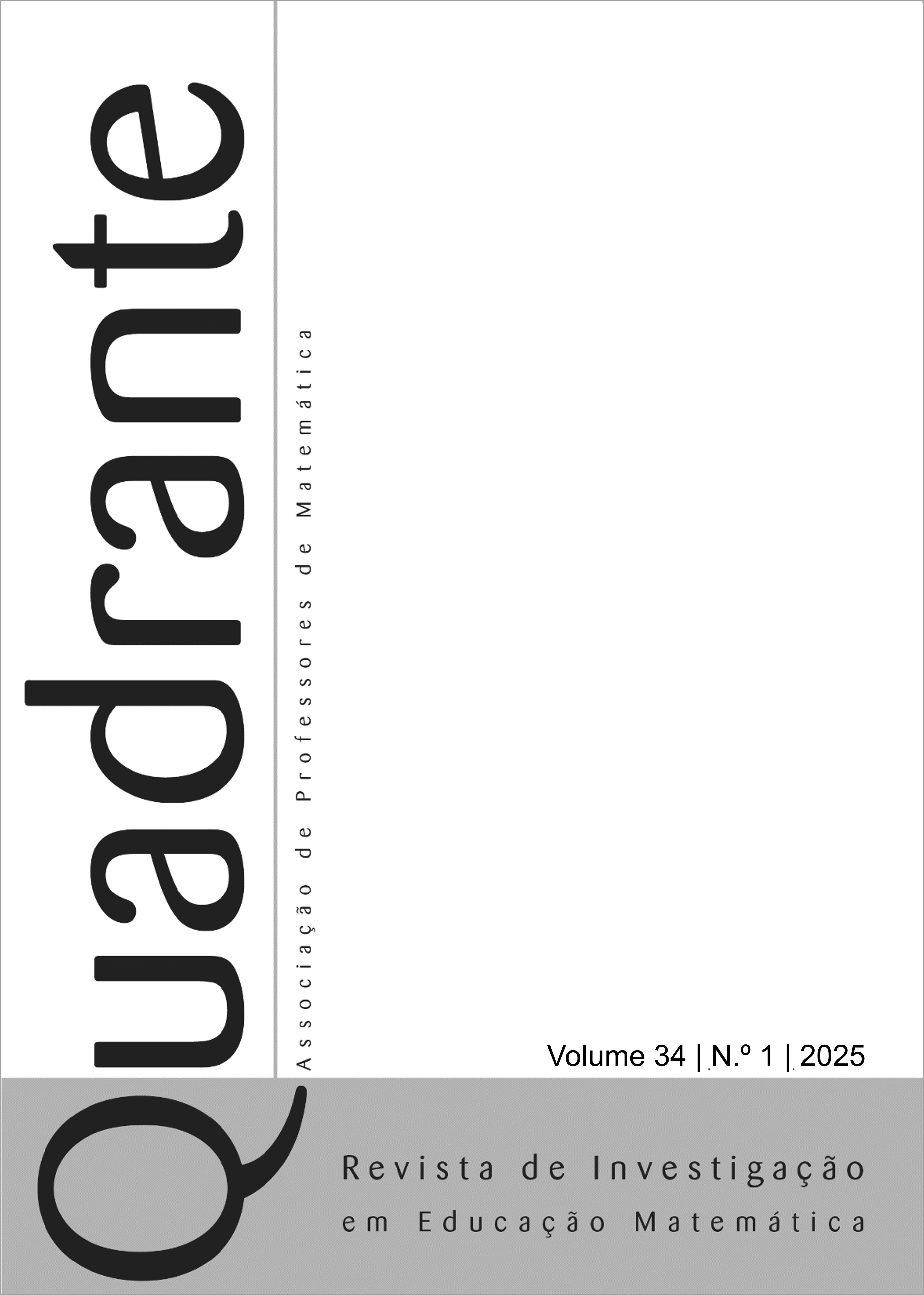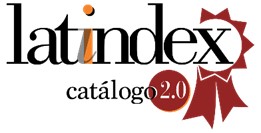Preservice teachers’ didactical knowledge for teaching number sequences in a Flipped Classroom context
DOI:
https://doi.org/10.48489/quadrante.41205Keywords:
preservice mathematics teachers, didactic knowledge, hybrid lesson, flipped classroom, number sequencesAbstract
In this article, we present the results of a study that aims to understand the didactic knowledge evidenced by two preservice mathematics teachers in the planning of a hybrid lesson within the Flipped Classroom approach for teaching number sequences. The data collection comprised the moments of planning of the hybrid lesson by the preservice mathematics teachers and involved the elaboration of instructional (asynchronous), exploratory (synchronous) and evaluative activities. The results point to the elaboration of the video lesson, quiz and exploratory tasks for teaching number sequence as major challenges for the undergraduate students in planning the hybrid lesson. However, it is revealed that the integration and articulation of different aspets of their didactic knowledge contributed to their ability to overcome these challenges. The results suggest that the elaboration, by mathematics undergraduates, of instructional materials for mathematics teaching, in a flipped classroom approach, supported by a cyclical process of instructional, exploratory and evaluative activities and that integrates the use of manipulative teaching resources and digital technologies, can support the development of preservice mathematics teachers as reflective professionals and contribute to the enhancement of their didactic knowledge for teaching mathematics.
References
Albuquerque, C., Veloso, E., Rocha, I., Santos, L., Serrazina, L., & Nápoles, S. (2006). A Matemática na formação inicial de professores. APM e SPCE.
Ball, D., Thames, M., & Phelps, G. (2008). Content knowledge for teaching: what makes it special? Journal of Teacher Education, 59(5), 389-407. https://doi.org/10.1177/0022487108324554
Brasil (2018). Base nacional comum curricular: ensino médio. Ministério da Educação. MEC. http://basenacionalcomum.mec.gov.br
Bergmann, J., & Sams, A. (2012) Flip Your Classroom: reach every student in every class every day. ISTE.
Coutinho, C. (2011). Metodologia de investigação em ciências sociais e humanas: teoria e prática. Almedina.
Flipped Learning Network (FLN). (2014). The Four Pillars of F-L-I-P™. https://flippedlearning.org/definition-of-flipped-learning/
Fonseca, V. (2019). Aprendizagem com compreensão dos conceitos de limite e continuidade: uma experiência de ensino com recurso ao GeoGebra na formação inicial de professores de matemática, no Brasil. [Tese de doutoramento, Universidade de Lisboa]. Repositório da Universidade de Lisboa. http://hdl.handle.net/10451/42789
Fonseca, V., Arquieres, D., Carvalho, E., & Freitas, L. (2023). Prática didática, em contexto de ensino remoto emergencial, sobre número racional por futuros professores de Matemática: do planejamento à execução. In J. Gaspar, A. Farves, H. Rosa & M. Bastos (Orgs.), Educação matemática e ensino híbrido: possibilidades e desafios para sala de aula (pp. 41-59). Nova Xavantina. https://doi.org/10.46420/9786585756105
Fonseca, V., Arquieres, D., Pedro, V. S., & Borges, I. R. L. (2023). Acción de futuro profesor de matemáticas en la implementación de una práctica didáctica, en un contexto de enseñanza remota de emergencia, sobre la ecuación exponencial. Intersaberes, 18, E023tl4019. https://doi.org/10.22169/revint.v18.E023tl4019
Fonseca, V., & Terra, M. (2017). Sala de aula invertida no ensino de fatoração algébrica: um estudo sobre o pensamento algébrico evidenciado por estudantes brasileiros do 8º ano. Cuadernos de investigación y formación en educación matemática, 18, 43-60. https://revistas.ucr.ac.cr/index.php/cifem
Hill, H., & Ball, D. (2009). The curious – and crucial – case of Mathematical Knowledge for Teaching. Phi Delta Kappan, 91(2), 68-71.
Lima, G., & Bianchini, B. (2022). Reflexões sobre o ensino e a aprendizagem de álgebra a partir das produções do GT04 da SBEM. Educação em Revista, 38, 245-264. https://doi.org/10.1590/0102-469824723
Lo, C., Hew, K., & Chen, G. (2017). Toward a set of design principles for mathematics flipped classrooms: A synthesis of research in mathematics education. Educational Research Review, 22, 50-73. http://dx.doi.org/10.1016/j.edurev.2017.08.002
Magina, S., Santana, E., Santos, A., & Merlini, V. (2018). Espiral RePARe: Um modelo metodológico de formação de professor centrado na sala de aula. Revista da Rede Amazônica de Educação em Ciências e Matemática, 2(6), 1–22.
Mishra, P., & Koehler, M. (2006). Technological pedagogical content knowledge: A framework for integrating technology in teachers’ knowledge. Teachers College Record, 108(6), 1017–1054. https://doi.org/10.1111/j.1467-9620.2006.00684.x
National Council of Teachers of Mathematics – NCTM (2000). Principles and standards for school mathematics. NCTM.
Nóvoa, A. (2009). Para uma formação de professores construída dentro da profissão. In A. Nóvoa (Org.). Professores: imagens do futuro presente, (pp. 25-46). Educa.
Ponte, J. (2012). Estudiando el conocimiento y el desarrollo profesional del profesorado de matemáticas. In N. Planas (Coord.), Teoria, crítica y prática de la educación matemática (pp. 83-98). Graó. http://hdl.handle.net/10451/29194
Ponte, J., & Branco, N. (2013). Pensamento algébrico na formação inicial de professores. Educar em Revista, 50, 135-155. http://doi.org/10.1590/S0104-40602013000400010
Ponte, J., & Chapman, O. (2008). Preservice mathematics teachers' knowledge and development. In L. English (Ed.), Handbook of international research in mathematics education. (vol. 2, pp. 225-263). Routldge.
Radford, L. (2010). Algebraic thinking from a cultural semiotic perspective. Research in Mathematics Education, 12(1), 1-19. https://doi.org/10.1080/14794800903569741
Santana, E., Ponte, J., Serrazina, M. (2020) Conhecimento didático do professor de matemática à luz de um processo formativo. Bolema, 34(66), 89-109. https://doi.org/10.1590/1980-4415v34n66a05
Schreiber, K, Pereira, E, Machado, C., & Porciúncula, M. (2018). Sala de aula invertida no ensino de Matemática: mapeamento de pesquisas científicas na área de Ensino. Educação Matemática Pesquisa, 20(2), 222-235. http://dx.doi.org/10.23925/1983-3156.2018v20i2p222-235
Shulman, L. (1986). Those who understand: knowledge growth in teaching. Educational Researcher, 15(2), 4-14.
Shulman, L. (1987). Knowledge and teaching: foundations of the new reform. Harvard Educational Review, 57(1), 1-21.
Silva, A., Gaspar, J., & Fonseca, V. (2022). Simetria Axial na pandemia da covid-19: uma proposta didática com recurso do uso de dobraduras e o GeoGebra. In J. Gaspar, A. Silva, M. Bastos, & V. Fonseca (Orgs.), Ciclo de formação em ensino de matemática: contribuições do ensino, da pesquisa e da extensão na formação do professor de Matemática (pp. 11-26). Nova Xavantina. https://doi.org/10.46420/9786581460372
Valente, J. A. (2014). Blended learning e as mudanças no ensino superior: a proposta da sala de aula invertida. Educar em Revista, 4, 79-97. https://doi.org/10.1590/0104-4060.38645
Wolcott, H. (2009). Writing up qualitative research (3rd ed.). Sage.











